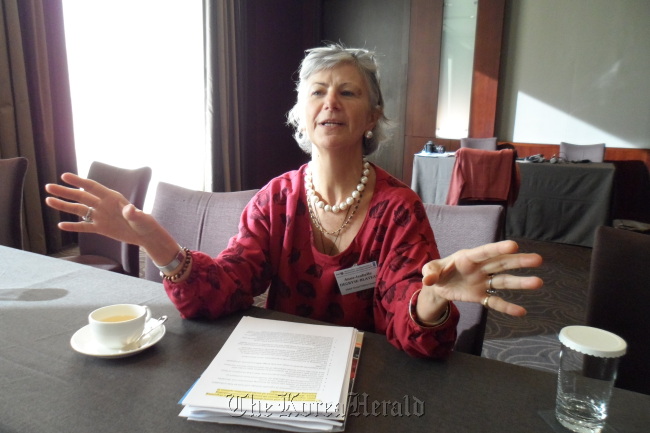Globalization spreads growth and risks. Trade and development have lifted many countries out of poverty but also left inequality and disintegration in their wake.
To cope with the “growing pains,” countries should pursue a strategy that intrinsically combines growth and social protection in a way tailored to their unique conditions and specific needs, said Anne-Isabelle Degryse-Blateau, director of the United Nations Development Program’s Seoul Policy Center.
“Social protection is actually an essential component of growth strategy. But for it to work, it has to be fully embedded into the growth strategy so it becomes part and parcel of it,” she said in an interview with The Korea Herald.
“A good thing is that well targeted social protection can also over time create its own financing. Social protection is to not be seen as costs but as investment.”
A French-born economy and development expert, Degryse-Blateau is the founding chief of the Policy Center, launched in January 2011. She joined the UNDP in 1987 and has served in Asia for the past 12 years.
The facility was as an upgraded successor to the UNDP’s Seoul office, which she headed between 2001 and 2005. It ended its 46 years of operation in 2009 following Korea’s miraculous transition from one of the world’s poorest countries to a member of the OECD’s club of aid donors.
To reflect people’s needs while keeping the economy running, governments should tailor social protection systems to their growth strategy by working with state agencies, the private sector, local communities and civil society, Degryse-Blateau said.
A thorough assessment of existing schemes is an overriding task that will help define the goal, prioritize demands and avert any overlap. Pilot testing can boost efficiency. Any new project should be capable of adjusting to drifts of the political, economic and social landscape, she noted.
 |
Anne-Isabelle Degryse-Blateau, director of the U.N. Development Program’s Seoul Policy Center |
“I think one of the important things is that a social protection system cannot work in isolation. You can’t just give a benefit and hope everything is going to work out. It needs to be coordinated with other actions to be effective,” Degryse-Blateau said.
While globalization fuels widespread political and economic restructuring across continents, more people look to their governments for help.
In the words of Degryse-Blateau, globalization means a “globalization of risks,” which encourages countries to build social protection systems because they are “exactly more vulnerable.”
But she draws a line between “social assistance” entailing unconditional cash transfers and handouts, and “social insurance” with an exit strategy and a pool of emergency funds.
“Entitlements should not be seen as a permanent feature. Eventually at some point you’re going to be graduating out of it because the whole purpose of social protection is actually to go back to empowering people,” she said.
What is essential, she says, is having a social safety net that helps the vulnerable become self-reliant and the whole economy more resilient to rebound faster during crises.
“Build it in the times when the economy is growing so that you have already something in place when a crisis hits. And you can eventually scale up some of the others in that period. So it’s kind of countercyclical,” Degryse-Blateau said.
Despite mounting calls for greater welfare spending and controversy surrounding populism and fiscal health, Korea provides a good example of gradual establishment and constant adjustment, she said.
Korea’s social outlays account for a meager 7.5 percent of gross domestic product, among the lowest in the OECD with a 20 percent average.
With the country’s ascent to Asia’s fourth-largest economy, the mainstay of the welfare state has steadily shifted from families and firms to the national pension service, which started in 1988 and entered full-fledged operations in 1999.
“Of course, now with the aging population and delays of employment like many countries, Korea is going to have to look into the current system, assess how strong it is, how it will eventually be retooled to address some of the upcoming challenges,” she added.
The issue of welfare has been a hot-button issue in the December presidential election. Candidates are relaying their respective recipes for social security and cohesion.
The Seoul Policy Center brought together officials from about 20 countries for a policy dialogue on social protection on Friday, co-hosted by the state-run Korea Development Institute and sponsored by the Ministry of Foreign Affairs and Trade.
Themed “Mitigating Vulnerabilities and Promoting Resilient Growth,” the two-day event fosters knowledge sharing on sequencing, cost-efficiency and fiscal sustainability of social safety schemes. The results of the forum will be delivered to a Group of 20 working group.
“First of all, they’re not alone. Second, they can learn from each other. That was the whole purpose because although each country is different but they still have similarities in terms of challenges,” Degryse-Blateau said.
“It’s clear that countries have different financial capacities. But definitely nonaction of social protection, saying like we’ll go for growth first, then social protection, that doesn’t work. You have to bring them together.”
By Shin Hyon-hee (
heeshin@heraldcorp.com)




![[Herald Interview] 'Trump will use tariffs as first line of defense for American manufacturing'](http://res.heraldm.com/phpwas/restmb_idxmake.php?idx=644&simg=/content/image/2024/11/26/20241126050017_0.jpg)

![[Health and care] Getting cancer young: Why cancer isn’t just an older person’s battle](http://res.heraldm.com/phpwas/restmb_idxmake.php?idx=644&simg=/content/image/2024/11/26/20241126050043_0.jpg)

